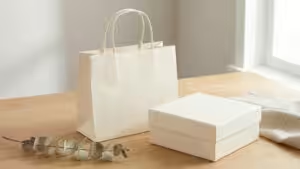Last Updated on May 30, 2025 by Packoi Team
The practicality of using plastic bags is no longer acceptable. With the demand for eco-friendly practices, businesses are forced to reconsider their packaging solutions.
If you want your retail business to stay competitive, you must stop using single-use plastic bags. It’s time to shift to reusable shopping bags.
In this article, you’ll discover why you must create sustainable retail bags for your customers. You’ll learn the specific materials you can use for your reusable bags, plus the details your bags shouldn’t go without.
5 Reasons to Start Using Sustainable and Reusable Bags
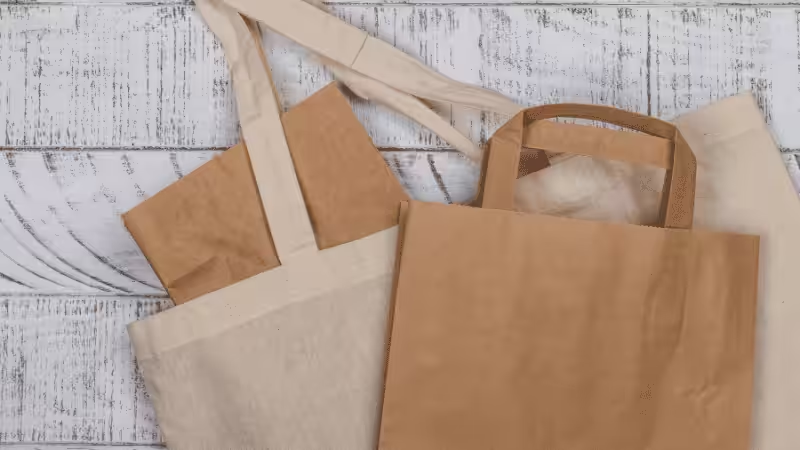
Even if your customers seem to be okay with using plastic bags, you need to consider the benefits of using reusable bags.
Admittedly, you’ll need to invest more to create reusable shopping bags. But this initial expense will bring a lot of rewards in the long run. These benefits won’t just affect your business. It’ll also have a huge impact on the environment.
Here are a few of the benefits that sustainable retail bags can bring.
Reason 1. Minimizes Pollutants Like Plastic Bags
Single-use plastic bags have always been a threat to the environment. Although they are lightweight and cost-efficient, decomposing takes a long time. It remains as trash that has littered the Earth for hundreds of years.
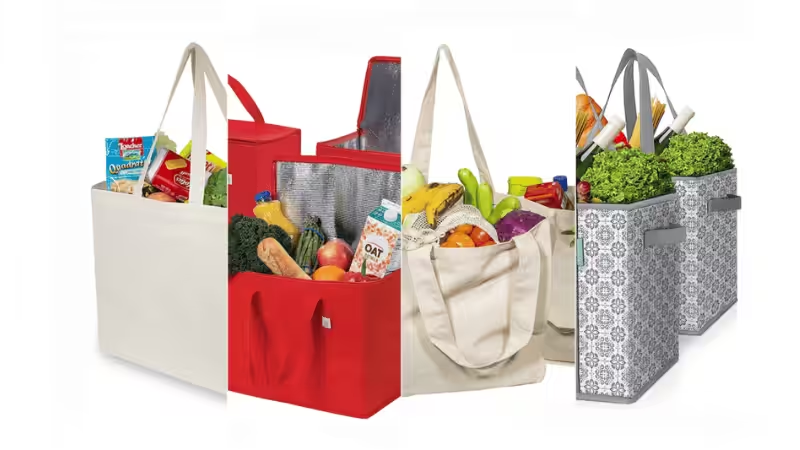
By using reusable retail bags, your brand can help lessen the pollutants that litter both land and water. There’ll be no need to use plastic bags that will be thrown away after the first use.
Customers can reuse the retail bags several times, keeping them away from landfills and trash sites.
Reason 2. Lower Operational Carbon Footprint
If you switch to reusable bags, there’ll be a lower demand for single-use plastic. There’s no need to operate machinery and process raw materials to create plastic bags. Energy consumption will also be lower because the need to make new reusable bags won’t be as great as that of their single-use counterparts.
This means reusable shopping bags lower the operational carbon footprint of the packaging industry. This is a good thing because it keeps greenhouse gas emissions low, which will eventually help combat climate change and all its negative environmental effects.
Reason 3. Protects Marine and Wildlife
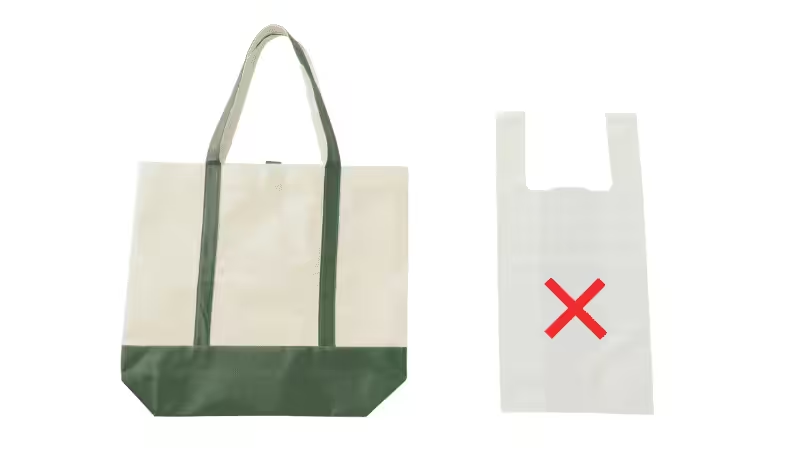
One of the negative environmental impacts of plastic waste is that it endangers both marine and wildlife. There have been countless reports of marine life found dead or in grave danger because they got caught up in plastic. The same is true for various wildlife on land.
Reusable bags can lessen this danger. The fact that it doesn’t have to be thrown away immediately lessens the world’s trash problem. The one bag that can be used several times can save animals from potential harm.
Reason 4. Saves Cost
Not just the environmental benefits, but also when you switch to reusable bags. Another benefit is that it saves money.
For instance, several countries and regions, including Ireland and some areas in the United States, offer tax incentives to retail businesses that use reusable grocery bags. Companies won’t have to pay a plastic bag tax or something similar.
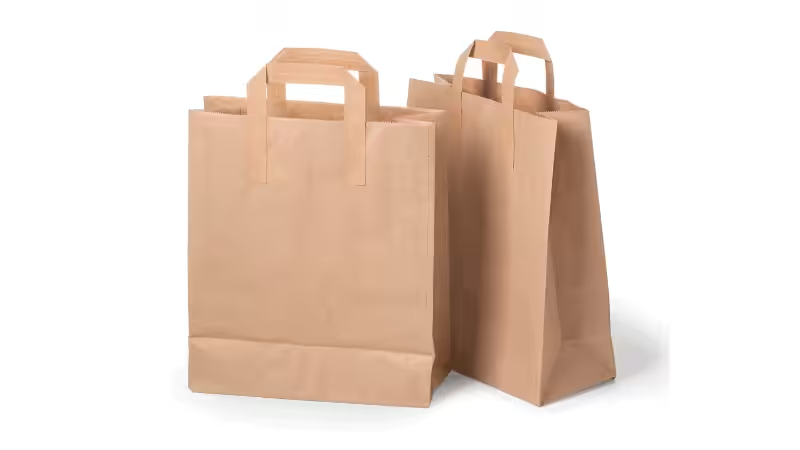
Of course, reusable retail bags will be more expensive per piece. But the fact that it can be reused means you don’t have to buy a lot or as frequently as you did before.
Reason 5. Elevate the Brand Value
Remember that your packaging is an extension of your brand. With the right materials, it can uplift your brand image.
Don’t miss this opportunity.
Reusable bags are influential enough to change how people perceive your brand. Since you need to enhance the quality of your bag if you want to make it reusable, the higher quality will reflect positively on your brand. It’ll elevate the value of your brand, even more so than when you were using plastic bags.
6 Materials You Can Use to Make Sustainable Retail Bags
With several eco-friendly options available, choosing the right material for your reusable retail bags can feel overwhelming. To help you compare them more easily, here’s a quick breakdown of the most popular sustainable materials, highlighting their key benefits and considerations.
| Material | Key Benefits | Biodegradable | Recyclable | Customizable | Cost |
|---|---|---|---|---|---|
| Paper | Lightweight, biodegradable, recyclable | ✅ | ✅ | ✅ | $$ |
| Bamboo | Renewable, fast-growing, durable | ✅ | ❌ | ✅ | $$$ |
| Organic Cotton | Soft, washable, eco-friendly if organic | ✅ | ✅ | ✅ | $$$ |
| Jute | Strong, affordable, absorbs CO₂ | ✅ | ❌ | ✅ | $$ |
| Hemp | Durable, chemical-free, carbon-absorbing | ✅ | ✅ | ✅ | $$$$ |
| Recycled Paper | Low-energy production, reuses old materials | ✅ | ✅ | ✅ | $ |
There are a lot of options to choose from. Here are six materials that you can use to replace plastic and have a more positive environmental impact in more detail.
1. Paper Bags
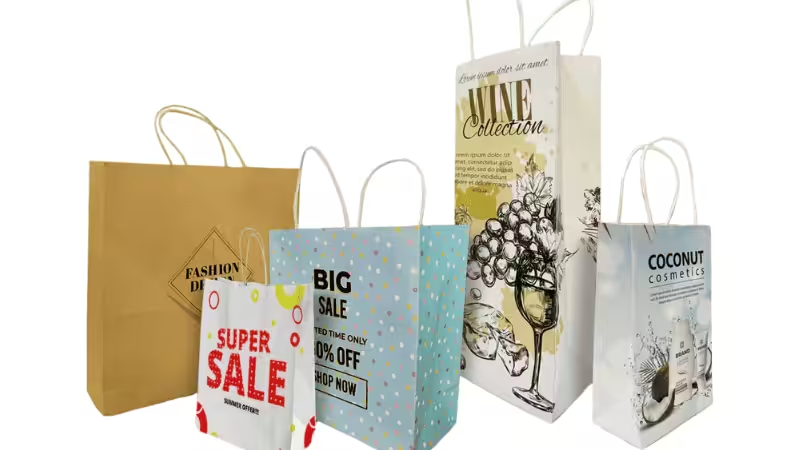
Using paper as an alternative material for reusable shopping bags might seem difficult, but it can work.
The paper must be thick and durable enough to be used multiple times. What’s great about paper bags is that they are 100% biodegradable. You can also recycle and reuse the material up to 5-7 times. This means it’ll stay out of landfills for a long time.
The paper also comes from a renewable source – trees. But make sure you’re getting from an FSC-certified company. That way, you’re sure that the paper is taken from responsibly managed forests.
2. Bamboo Bags
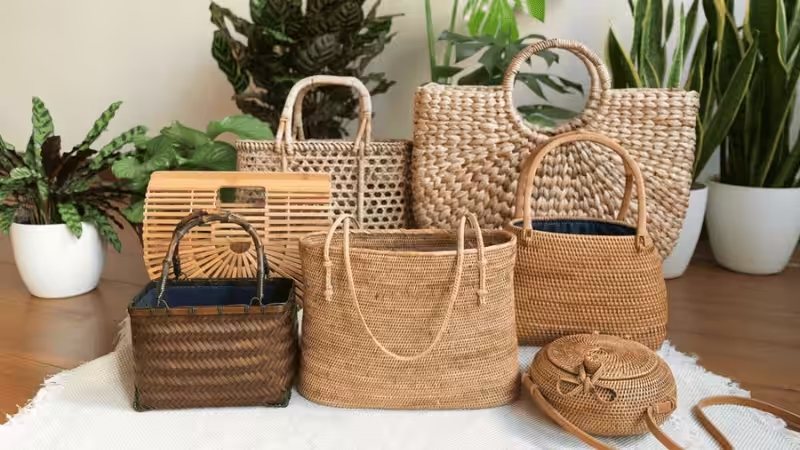
Among the eco-friendly materials, this is the one that rivals paper bags. It’s eco-friendly and renewable as well. It also grows incredibly fast. You can harvest bamboo in 3 to 7 years. It’s a worthy alternative to both paper and plastic.
Like paper, bamboo bags are also biodegradable. That means they easily break down and won’t leave a negative environmental impact.
3. Organic Cotton Bags
Cotton bags are also a great way to make your retail bags more reusable. Cotton can be woven into fabric that can be washed and reused multiple times.
If you choose organic cotton, that means the plant it came from didn’t use any chemicals or pesticides. The plant where it was harvested grew with minimal negative impact on the environment. This makes the organic cotton bag naturally biodegradable.
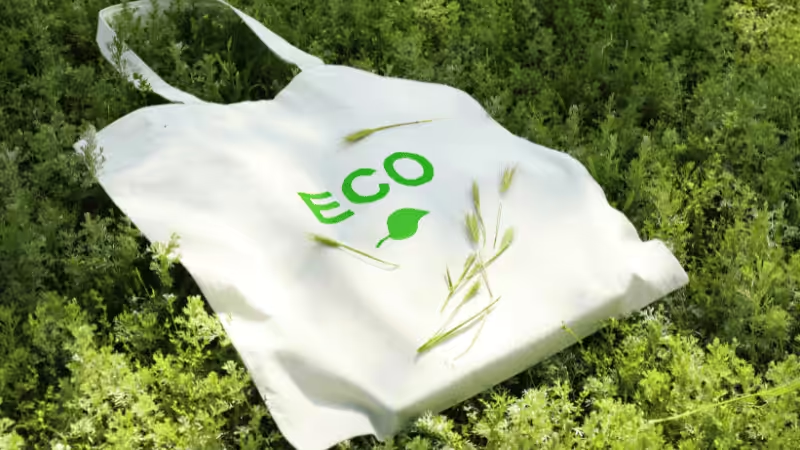
Unfortunately, producing this bag requires a huge amount of energy and water. Make sure to order only what is needed, nothing in excess.
4. Jute Bags
This type of bag uses an edible vegetable called golden fiber. It’s long and shiny with a combination of lignin and cellulose material. This makes it possible to transform into ropes, carpets, and reusable shopping bags.
The jute plant is renowned for its eco-friendliness. If you use it as the material for your bag, it’ll be biodegradable. Not only that, but this plant absorbs greenhouse gas emissions. The more jute plants are cultivated, the more they soak up carbon dioxide from the atmosphere.
These are also quite affordable. So that’s a great bonus to have.
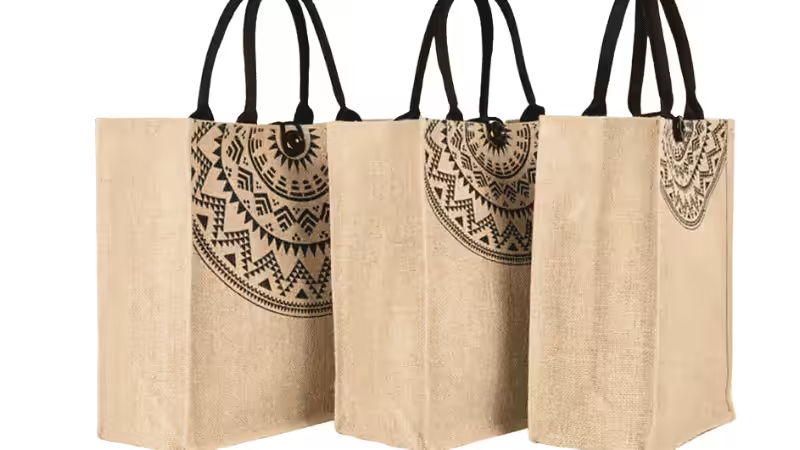
5. Hemp Bags
What’s great about hemp plants is that they don’t need any pesticides, fertilizers, or other chemicals to thrive. They are also drought-tolerant and great absorbers of carbon dioxide. Cultivating these plants will also be environmentally beneficial.
As a packaging material, it is a great alternative to plastic bags. It’s even considered stronger than plastic.
6. Recycled Bags
Finally, you can use recycled paper bags for your retail business. The recycling process usually requires less energy and less water to complete. So if you use recycled paper bags, it comes out more eco-friendly than the new ones.
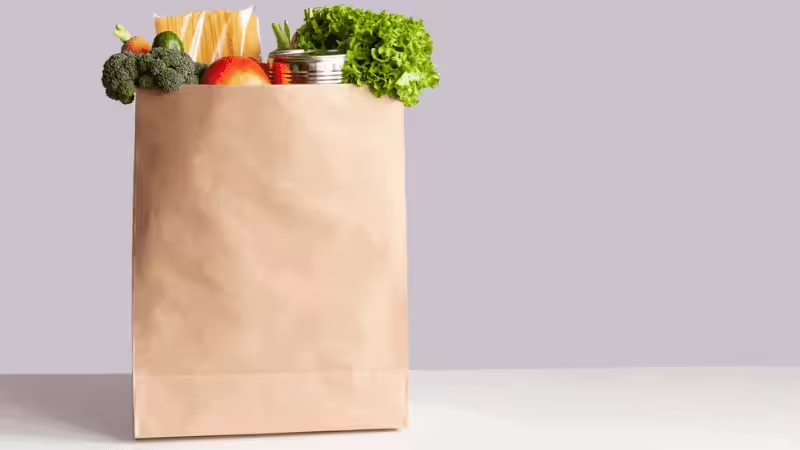
Recycling paper produces lower carbon emissions, which is a good way to keep your packaging sustainable.
3 Must-Have Details of Your Reusable Retail Bags
Now that you better grasp the materials you can use for your eco-friendly retail bags, it’s time to work on the design.
The thing about retail bags is that they don’t represent one product. They represent the whole retail business. As your customers carry this bag around, they will give you free advertising. So think about personalized content and ads when you design your retail bags.
Here are three things that your bag must have.
Use It to Market Your Brand

Put enough branding elements in your retail bag. It could just be a simple print of your retail business. Or it could be your logo. It could even be your brand colors.
What’s important is that the bag will be recognized as yours. Make the print clear and visible. You want people to be able to read the brand clearly as your customers carry the bag. Since the bag is reusable, you can expect that your brand exposure will be maximized.
Make every moment count to get the most mileage from your retail bag.
Promote Sustainability
Your retail bags should also promote sustainability. For instance, use paper bags so people know that you’re trying to be eco-friendly.
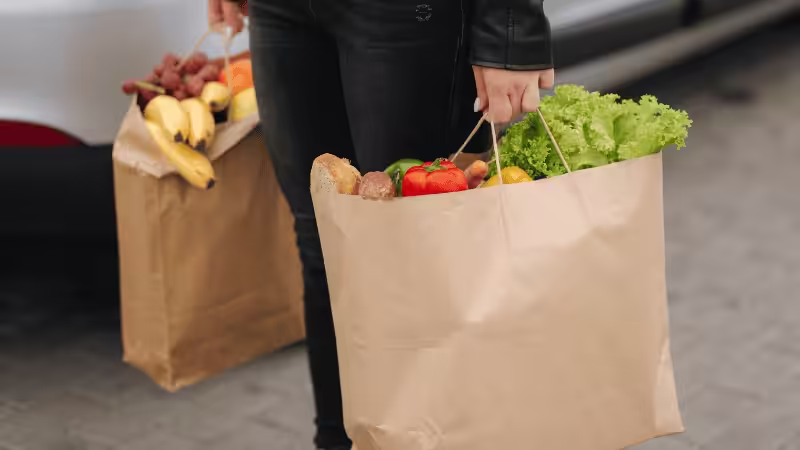
Or use cloth bags made of biodegradable material. Put a logo of a known green organization so people will know the environmental advocacies that you support.
Hopefully, these will inspire people to practice sustainability in their lives.
Make It Visually Appealing
The last thing you must do is make your retail bags visually appealing. If it’s not eye-catching, it won’t matter if your branding is there. It won’t matter if the customer carries it around.
People won’t take notice of it because it’s not visually appealing.
You can even make your custom reusable bags age-appropriate, if relevant. Make the retail bag design fun if you have a young target market.
Think about what will catch the attention of your market. That’s the design that you should use.
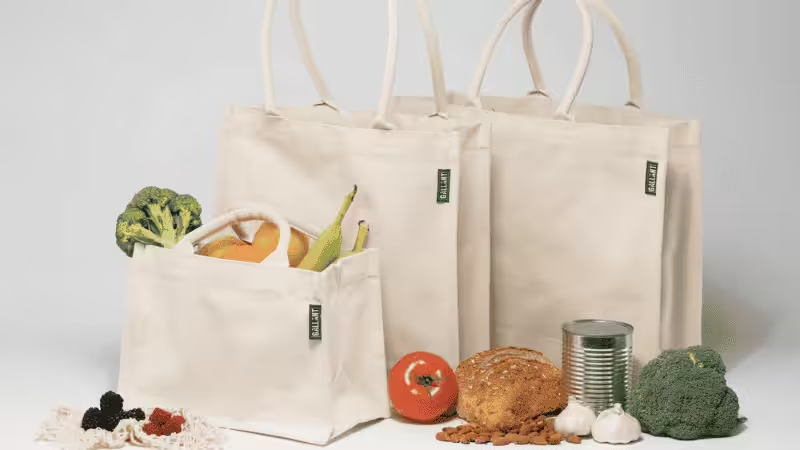
FAQs
Why should businesses stop using plastic bags?
Plastic bags harm the environment and contribute to long-term pollution.
What is the best material for sustainable retail bags?
Materials like paper, jute, cotton, hemp, and bamboo are among the best eco-friendly options.
How do reusable bags help with branding?
Reusable bags offer repeated brand exposure and communicate your commitment to sustainability.
Conclusion
The age of single-use plastic is over. With environmental concerns on the rise and customers demanding greener options, switching to reusable retail bags is no longer just a trend. By using eco-friendly materials like paper, bamboo, or organic cotton, and incorporating branding into every design, you elevate your business image while helping the planet.
Reusable bags reduce waste, lower your carbon footprint, save money long-term, and strengthen customer loyalty. It’s a small change with a massive impact.
Get Your Sustainable Retail Bags From Packoi!
If you use paper bags, look for an FSC-certified company like Packoi Printing. We get our paper products from FSC-certified forests. You can trust that our raw materials only come from responsibly managed forests.
Let’s talk about the retail bag that you want to create. We’ll make sure it’s as sustainable as it can be.
Call us, and we’ll get back to you with a fair quotation in no time.




